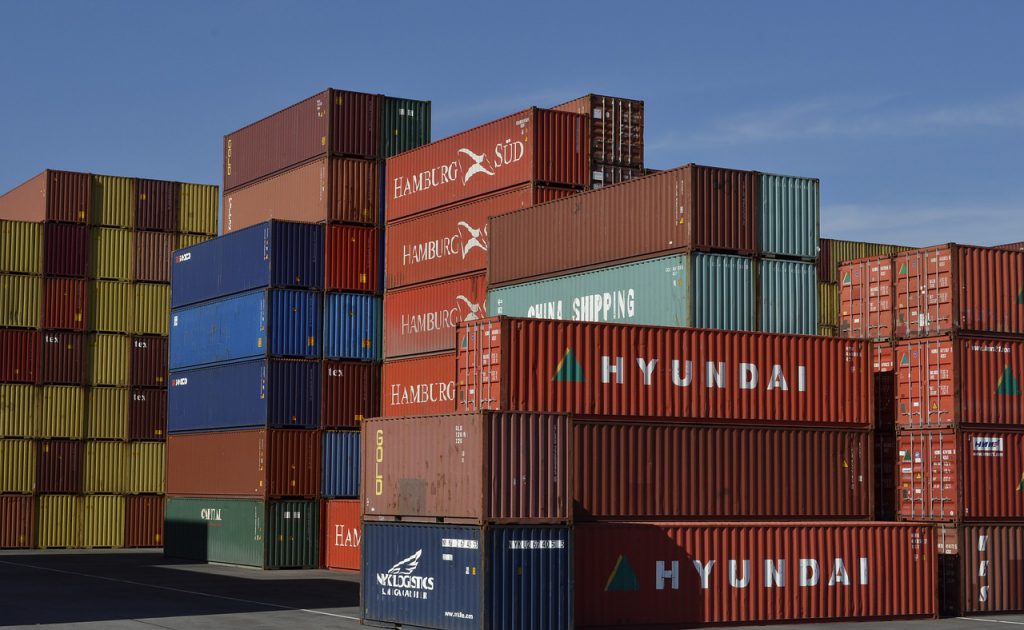The Inevitable Free Trading Country of Indonesia [English]

Ilustrasi peningkatan volume perdagangan di pelabuhan. Foto: pixabay.com.
Back when we were in school, be it elementary, junior high, or senior high, we were once told by our teachers that Indonesia is a unique country. The case might be coming out from your Geography teacher, telling the class that Indonesia is special because we are the only country in the world that is located between Asia and Australia continent, as well as Pacific and Indian Ocean.
The other case of praising the uniqueness of Indonesia might also come from your History teacher, telling you that we are multicultural because we are the result of local ethnics, Indian, Arab, European, and Chinese civilization combined. It might also be coming from your Civic Education teacher, telling you that we have the unique ideology of Pancasila, whereas the other countries only adhere to mainstream ideologies either from the left or right side of spectrum (some even haven’t decided yet).
Or if you’d been lucky, you would have experienced all the stated situations combined.
If I have to be frank with you all, despite all the rhetorics, I actually love what those teachers had done to us. They made us understand that Indonesia is a strategic country with multiculturalism as its backbone.
Well, is it, though?
It might sometimes get questioned but for me, it is.
The Cautious Indonesia
Now, we can safely assume that we have at least two advantages already: strategic geospatial and openness towards others. That can be understood as strong backgrounds to go outside and mingle with the others.
Unfortunately, we are yet to do it all out.
One strong argument of why Indonesia is very cautious of mingling with the other countries is because we have strong anti-colonialism idea. Given the fact that we were fighting the Netherlands, the Japanese, and even the English for hundreds of years in total, that strong idea is understood. The Soekarno in us will scream painfully if we lean ourselves towards Western hemisphere countries. So cooperation, especially with the West, will be cautiously greeted.
Except the settings are totally different now. We haven’t had world war for more than 70 years. Cold war ended 31 years ago. Capitalism and free trade is now the dominant discourse. It’s also safe to say that it will stay for years, given how the socialist countries — as the alternatives — like Cuba and Venezuela are like. So, having anti-colonialism idea within our blood is actually fine, but at the same time, we also have to make sense of our reality, and those are economic openness and free trading.
On top of it, Indonesia’s closest neighbouring countries, Malaysia and Singapore, have proven that economic openness has quickly improved their life. The fact that Malaysia and Singapore’s independence were way more later than Indonesia, yet their current Gross Domestic Product (GDP) per capita are already so much higher than us, should have given you a perspective of economic openness. Despite them being isolated culturally and not really adhering to democratic values, their economy was and is being built on cooperation with public and private stakeholders from all over the world.
Indonesia is Heading to Economic Openness like Never Before
Lucky for you, economic growth lovers, that Indonesia is currently heading to economic openness. With the introduction of the controversial bill “Omnibus Law”, in which some of the laws will incentivize the investors to invest their money in Indonesia, there’s a strong will of the Jokowi’s government to actually make this country even more open economically. I’m not saying that the bill is not flawed, especially because it is at the very expense of the workers, but I’ll leave those critics to Twitter’s activists. In this article, I’d use that proposed bill simply to underline the strong will of improving economic openness by the current regime.
The other proof of the strong willingness is the ratification of Indonesia-Australia Comprehensive Economic Partnership Agreement (IA-CEPA). IA-CEPA, like many Free Trade Agreements (FTAs), show you the will of the government to be more opened economically. If we look at the data of Asia Regional Integration Center (ARIC) by Asian Development Bank (ADB), Singapore and Malaysia are ahead of Indonesia in terms of dealt FTAs scheme. Singapore currently has 24 FTAs that are signed and in effect, while Malaysia is on 16 FTAs. Indonesia? we only have 11 signed and in effect FTAs, and seven of them are with ASEAN, not bilaterally as independent country. But we have 17 FTAs that are already on Proposed/Under Consultation and Study status, more than Malaysia and Singapore combined.
So, if we look the data above, we can clearly see that we already have the will to talk and be opened with other countries/entities. The question now is, until when Indonesia will remain cautious and just stop at the proposed level of FTAs? I can understand that some of them may be too hard to be accelerated and the negotiations stalled, yet that also means we are slowing the progress of economic cooperation that is beneficial to us. We can remain cautious until forever, but do not be shocked or disappointed if Vietnam overtakes us economically anytime soon, just like what Malaysia and Singapore have already done years ago.
Hafizh Mulia adalah Pemimpin Redaksi Kontekstual. Bisa ditemui di Twitter dan Instagram dengan username @moelija.





